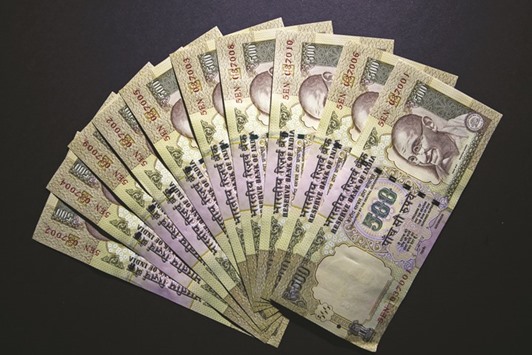Domestic money managers bought the most shares since May this week, joining overseas counterparts that have helped the Indian benchmark gauge climb to a 16-month high.
Local institutional investors have pumped $248mn into stocks in the past four days, the longest run of net purchases in three months and set to end eight weeks of withdrawals. Foreigners bought $279mn of shares in the period despite the prospect of US interest rates rising, data compiled by Bloomberg show.
The flows helped the S&P BSE Sensex advance 2.7% this week, the best performance in two months. The gains added to angst about valuations that are near the highest level in 16 months, with some investors predicting the momentum will cool in coming weeks as the market consolidates.
“Valuations are rich as the rally since February has been pretty much one way,” Kaushik Dani, a fund manager at Karvy Stock Broking in Mumbai, said by phone. “The market will consolidate at current levels before making the next move forward.”
Expensive valuations have been partly responsible for Indian money managers offloading stocks. Domestic funds pulled a total Rs126bn ($1.9bn) from June through August, the longest stretch of withdrawals since the five-month period ended July 2014, data compiled by Bloomberg show. In comparison, global funds invested a net $3.9bn amid optimism central banks will stay supportive of growth.
The Sensex is valued at 16.4 times projected 12-month profits, near the highest level since April 2015, and a 30% premium to the MSCI Emerging Markets Index. The BSE mid-cap index trades at 35 times reported earnings after the rebounding 37% from a low in February, data compiled by Bloomberg show.
Tata Motors, owner of Jaguar Land Rover, rose 1.1%, taking this week’s rally to 9.2%. That’s the best performance on the Sensex. Jaguar sales rose to 3,298 units last month from 1,143 vehicles a year earlier, according to a statement on its website. Land Rover sales rose to 6,031 units versus 5,225.
Hero MotoCorp advanced 0.9% to a record. Shipping Corp of India soared 6.8%, the most since July 5, after saying it plans to revive a 40-year-old joint venture with an Iranian company.
Hindustan Construction Co soared 8.4%, taking the week’s surge to 51%. The company expects to get 58bn rupees after settling claims with state agencies over the next 18 months, chairman Ajit Gulabchand said in a phone interview on Thursday.
Coal India, the world’s biggest miner of the fuel, fell 1.7% after it reported the lowest production and shipments in three years after heavy rain flooded its mines. Output in August dropped 10.4% from a year ago to 32.4mn metric tonnes and shipments fell 9.6% to 36.72mn tonnes, both plunging to the lowest since the same month in 2013.
The markets are closed on Monday for a public holiday.
Meanwhile the rupee yesterday strengthened for the fourth consecutive session and hit a two-week high against the US dollar after foreign institutional investors (FIIs) continued to buy in local equity markets. Traders are cautious ahead of the US payroll data due later on Friday.
The home currency closed at 66.83 per dollar—a level last seen on August 18, up 0.2% from its previous close of 66.96. The rupee opened at 66.83 per dollar and touched a high of 66.81, a level last seen on August 18.
Since March 1 till date, FIIs have bought $8.98bn in local equity markets, while the Sensex gained 23.5% in this period.
The 10-year bond yield closed at 7.118% compared with its Thursday’s close of 7.121%. Bond yields and prices move in opposite directions.
The rupee is down 1.2% till date this year, while FIIs have bought $6.11bn in equity and sold $1.33bn in debt markets.
Asian currencies closed mixed as investors waited to see if the US jobs data could prod the Federal Reserve into raising interest rates as early as this month.
The South Korean won was up 0.43%, Taiwanese dollar 0.21%, Indonesian rupiah 0.17%, Philippines peso 0.14%. However, the Japanese yen fell 0.33%, Malaysian ringgit 0.24%, Chinese offshore 0.1%, Chinese renminbi 0.1% and Thai baht 0.06%.

The rupee closed up 0.2% to 66.83 per dollar yesterday.
